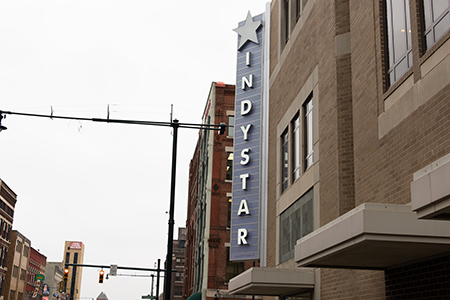Subscriber Benefit
As a subscriber you can listen to articles at work, in the car, or while you work out. Subscribe NowThe Indianapolis Star and three other media outlets were awarded the Pulitzer Prize for national reporting on Friday for an investigative series of stories on police dog bites.
The shared award went to the Star, AL.com, The Marshall Project and the Invisible Institute.
The series, called “Mauled: When Police Dogs are Weapons,” looked at “K-9 units and the damage that police dogs inflict on Americans, including innocent citizens and police officers, prompting numerous statewide reforms,” The Pulitzer Prize Board announced.
Indianapolis Star reporter Ryan Martin and photojournalist Mykal McEldowney were among a team of journalists to work on the series, which reviewed police dog bites nationally from 2017-19. The Star also credited graphics reporter Stephen Beard and news director Alvie Lindsay for their work on the series.
The review found that Indianapolis Metropolitan Police Department dogs bit 243 people over those three years, the highest rate of such bites among the country’s 20 largest cities.
IMPD enacted reforms to curb police dog bites shortly after the series was published.
AL.com is Alabama’s largest news and information site. The Marshall Project is a not-for-profit new organization that covers the criminal justice system. The Invisible Institute is a south-side Chicago not-for-profit journalism organization that focuses on accountability from public institutions.
Other finalists in the category were a look at the Trump administration’s response to the pandemic by The New York Times and a series on nursing home pandemic deaths by The Wall Street Journal.
The National Reporting prize paid $15,000 to the winners.
In other Pulitzer categories,
The Associated Press won two Pulitzer Prizes in photography Friday for its coverage of the racial injustice protests and the coronavirus’s toll on the elderly, while The New York Times received the public service award for its detailed, data-filled reporting on the pandemic.
In a year dominated by COVID-19 and furious debate over race and policing, the Star Tribune of Minneapolis won the breaking news prize for its coverage of George Floyd’s murder and its aftermath, while Darnella Frazier—the teenager who recorded the killing on a cellphone — received a special citation.
Frazier’s award was intended to highlight “the crucial role of citizens in journalists’ quest for truth and justice,” the Pulitzer Board said.
The AP and The New York Times each won two Pulitzers, the most prestigious prize in journalism, first awarded in 1917.
The feature photography prize went to AP’s chief photographer in Spain, Emilio Morenatti, who captured haunting images of an older couple embracing through a plastic sheet, mortuary workers in hazmat gear removing bodies, and people enduring the crisis in isolation.
The breaking news photography prize was shared by 10 AP photographers for their coverage of the protests set off by Floyd’s killing. One widely published photograph by Julio Cortez on the night of May 28 in riot-torn Minneapolis showed a lone, silhouetted protester running with an upside-down American flag past a burning liquor store.
“It is a tremendous honor to win not only one, but two Pulitzer Prizes for photography, and a true testament to the talent and dedication of AP photojournalists,” said AP President and CEO Gary Pruitt. “These photographers told the stories of the year through remarkable and unforgettable images that resonated around the world.”
The New York Times received its public service prize for pandemic coverage that the judges said was “courageous, prescient and sweeping coverage” and “filled the data vacuum” for the public. Wesley Morris of the Times won for criticism, for his writing on the intersection of race and culture.
Star Tribune journalists covered the rage in Minneapolis, where protesters burned buildings, including a police station, in the wake of Floyd’s death. The Black man died after a white Minneapolis police officer pinned him to the ground with his knee on Floyd’s neck for up to 9 1/2 minutes. The officer was later convicted of murder.
The Boston Globe received the investigative reporting Pulitzer for a series demonstrating the systematic failure by state governments to share information about dangerous truck drivers.
Brendan McCarthy, the editor on the series, said the Globe “quickly found that this kind of tragedy had been happening year after year for decades. The problems were in plain sight but had never been addressed.”
Prizes for explanatory reporting went to two recipients. Ed Yong of The Atlantic won for a series of deeply reported articles about the pandemic. Andrew Chung, Lawrence Hurley, Andrea Januta, Jaimi Dowdell and Jackie Botts of Reuters were honored for a look at the legal concept of qualified immunity and how it shields police from prosecution.
Two prizes for feature writing were also awarded. Nadja Drost won for her freelance piece in The California Sunday Magazine on global migration, and freelance contributor Mitchell S. Jackson for an account in Runner’s World on the killing of Ahmaud Arbery, a Black man who was chased down and shot while jogging in Georgia.
The winner of the public service Pulitzer is honored with a gold medal. The awards in the other categories carry a prize of $15,000 each.
Please enable JavaScript to view this content.


LOL. That is peak Gannett
One wonders how much difficulty the Star reporters encountered trying to wrest the data (which is public information) from the IMPD. That would likely make an interesting follow-up report. Previous Society of Professional Journalist surveys have shown that police agencies are among the most uncooperative in complying with the Freedom of information laws.
The police have no business using dogs for anything.
Have you no idea of how many additional, harmful drugs would be smuggled into the country, and bad guys stopped, if dogs didn’t sniff them out, Robert H?